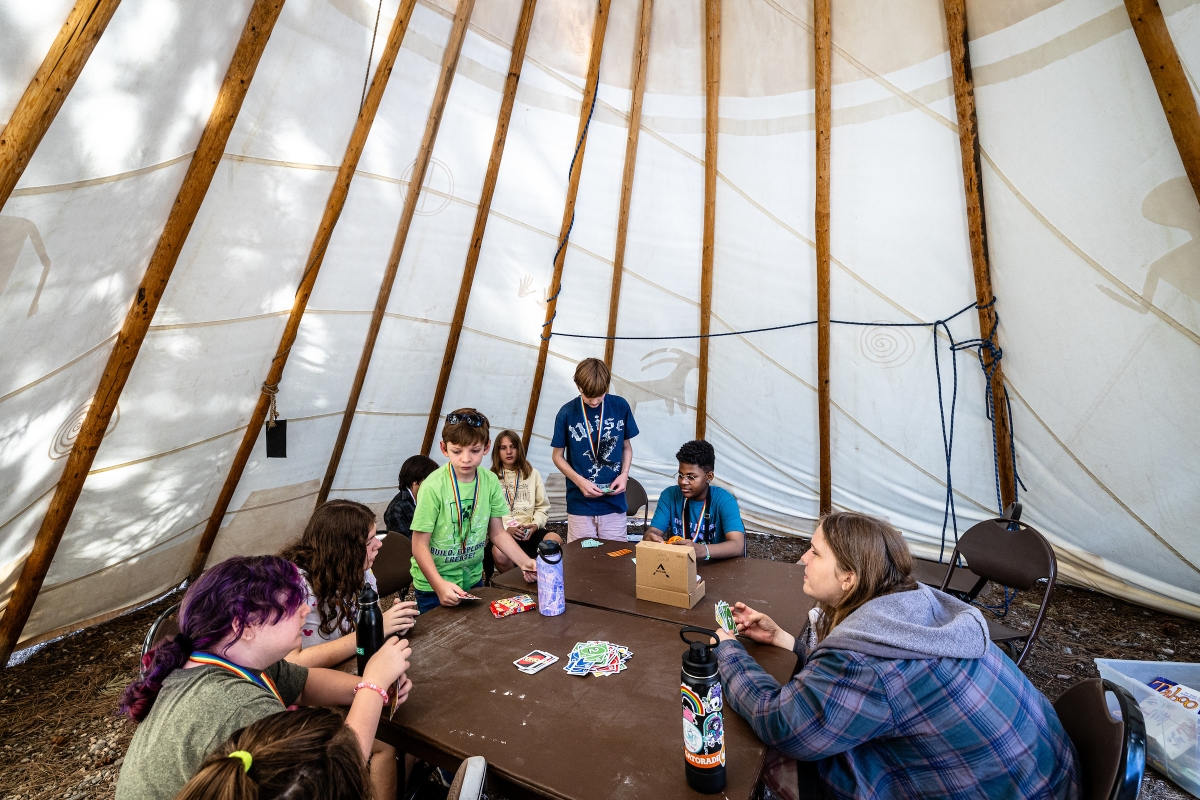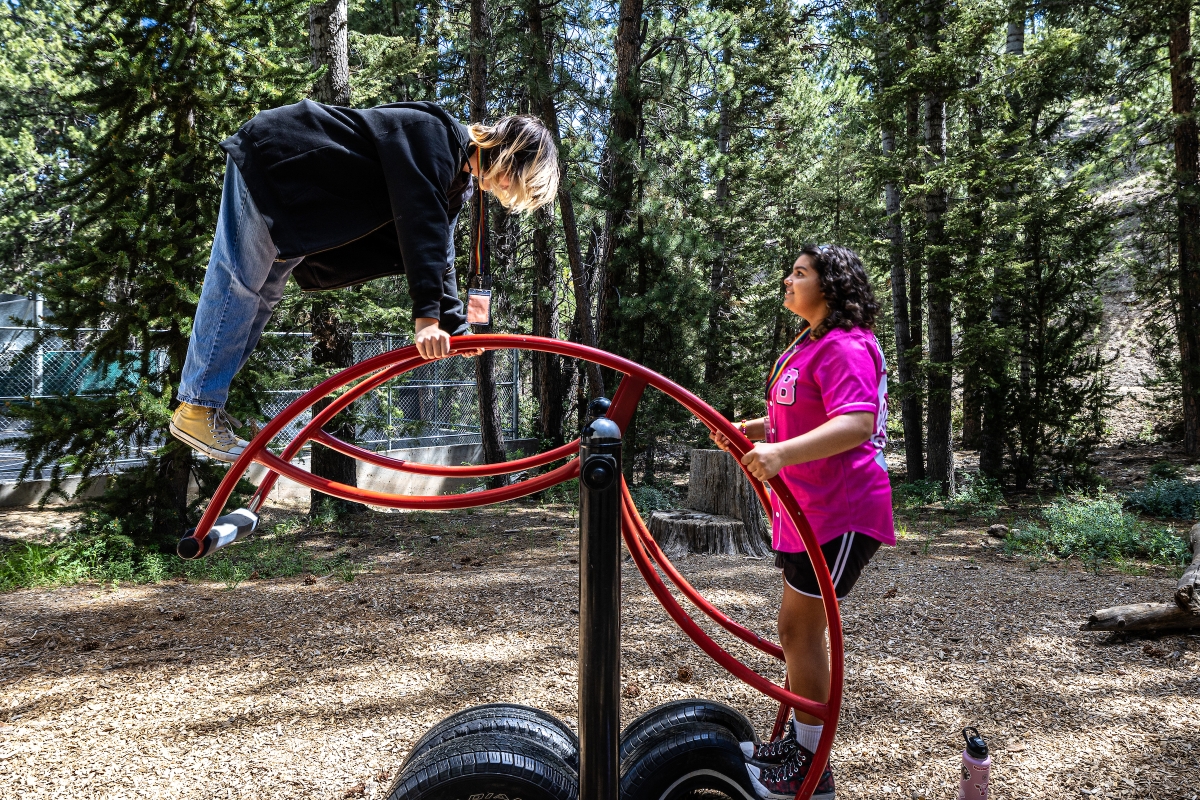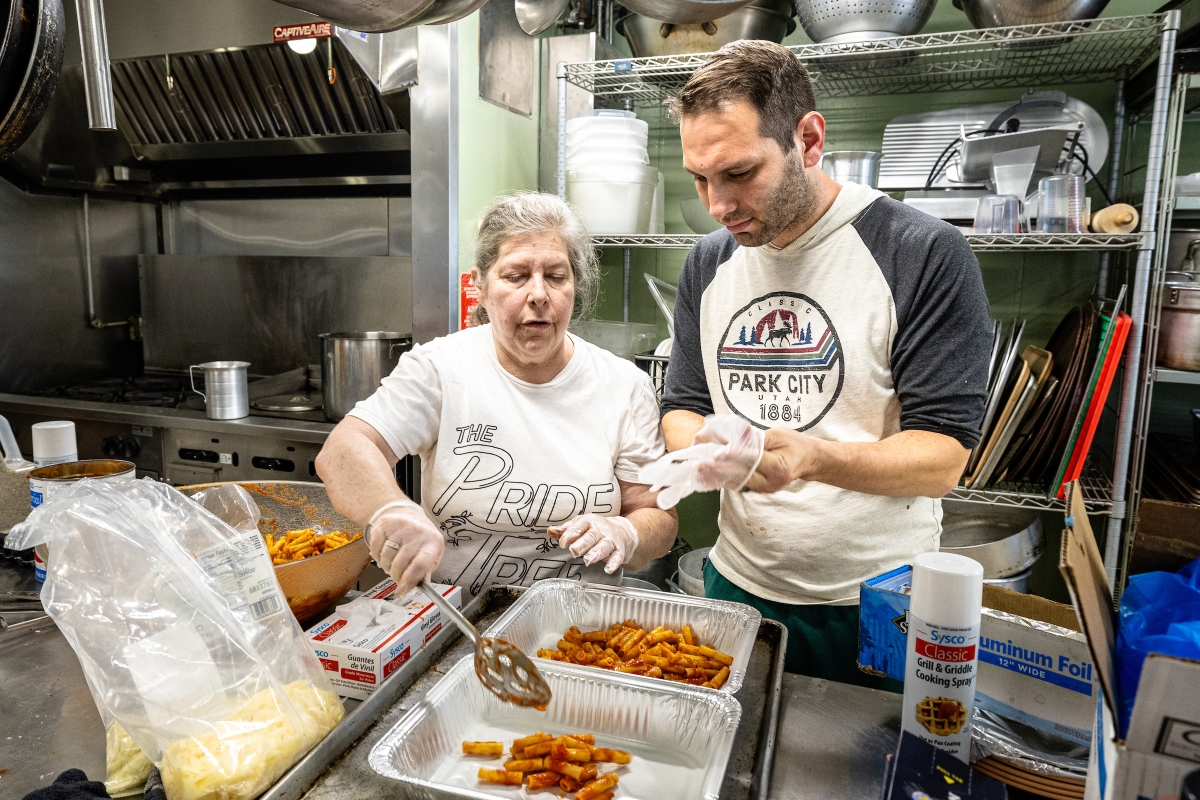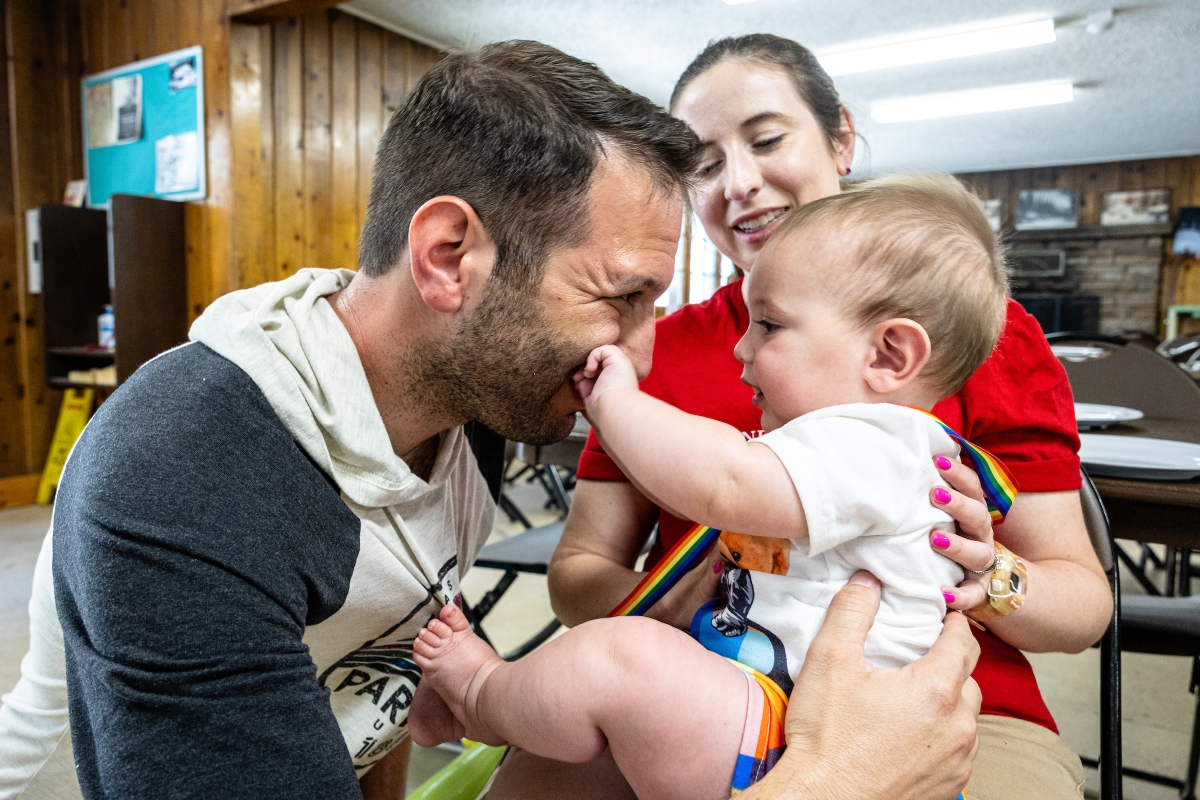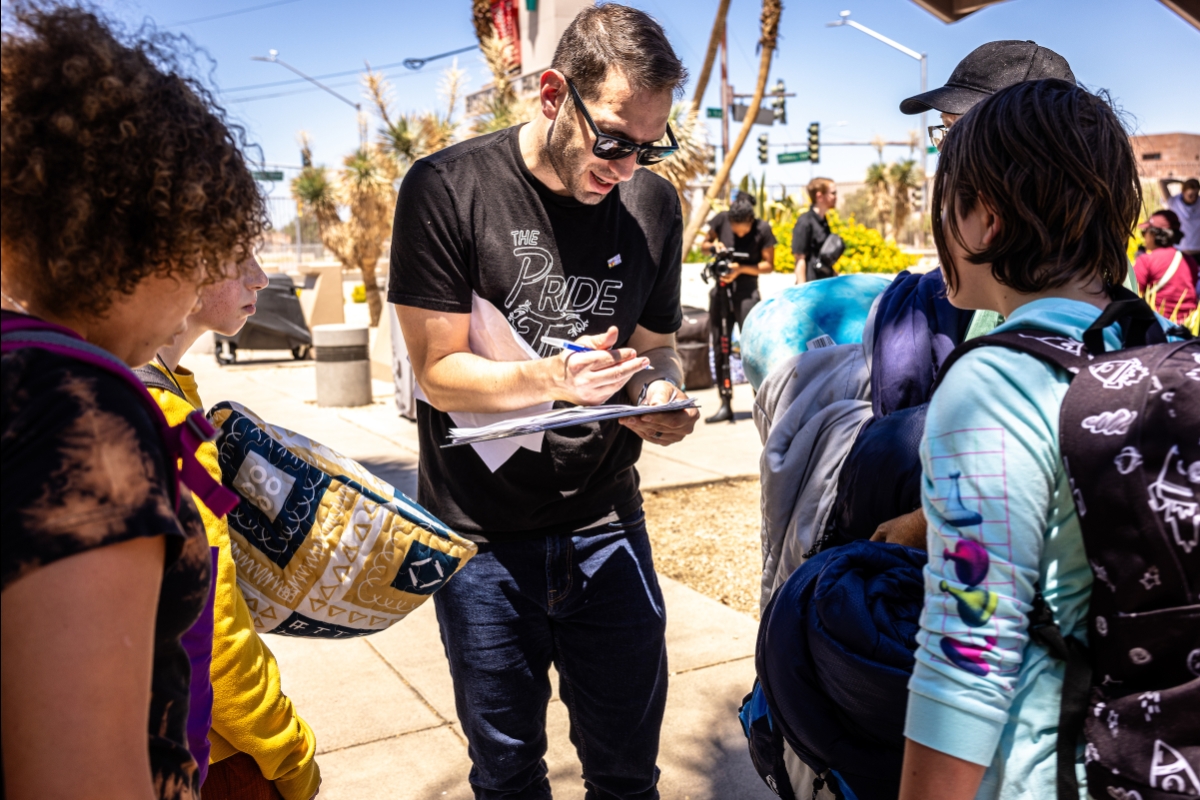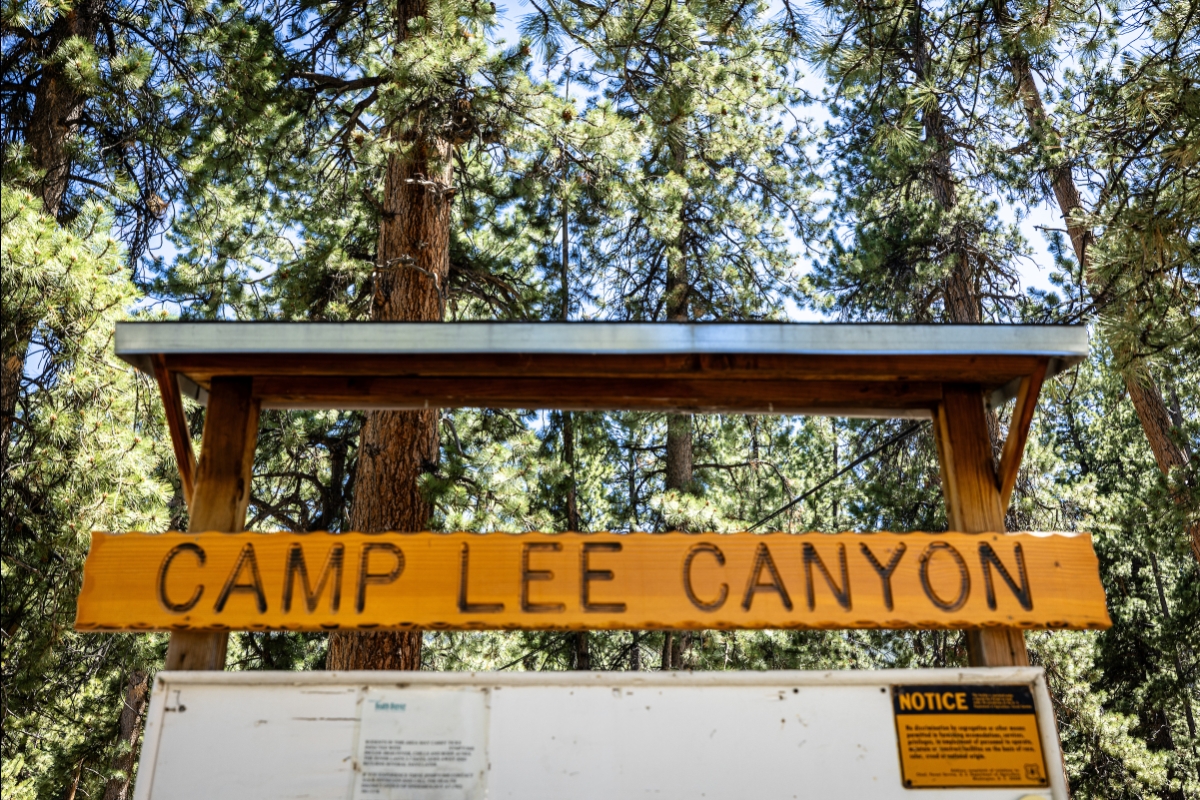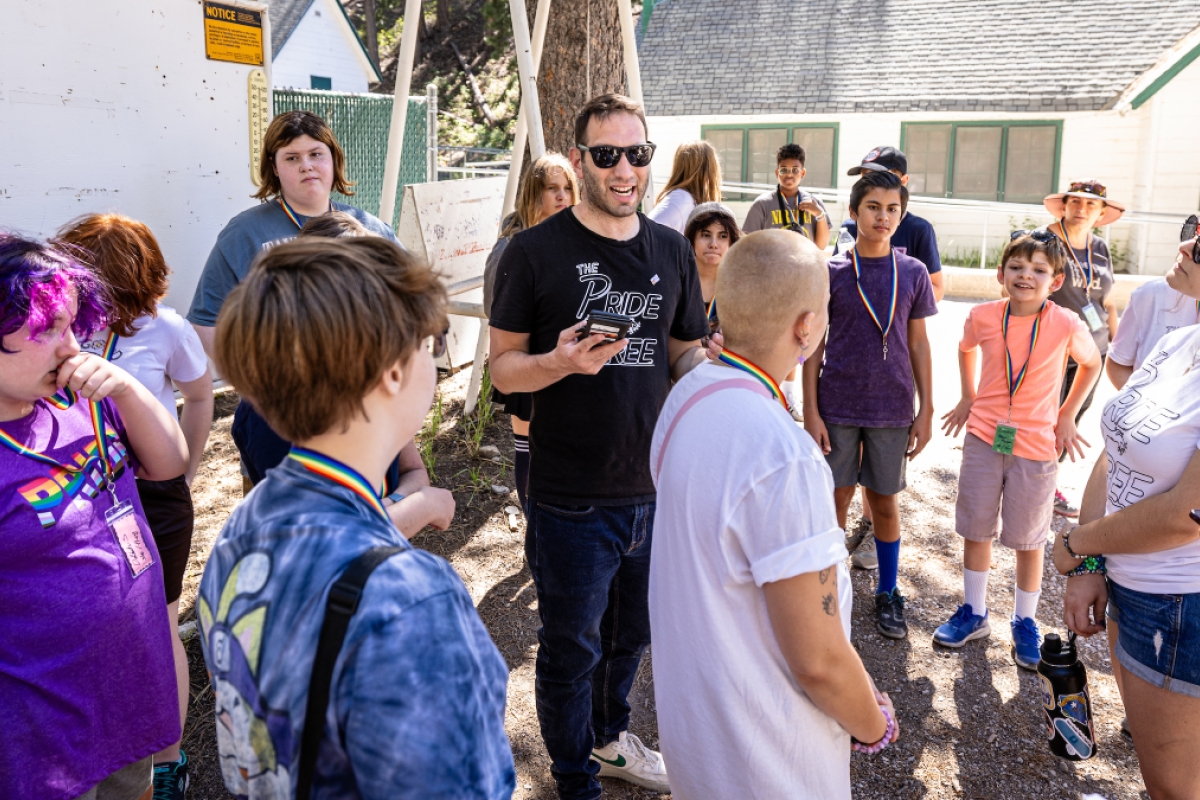Grandmother's experience in Holocaust inspires ASU alum to help others
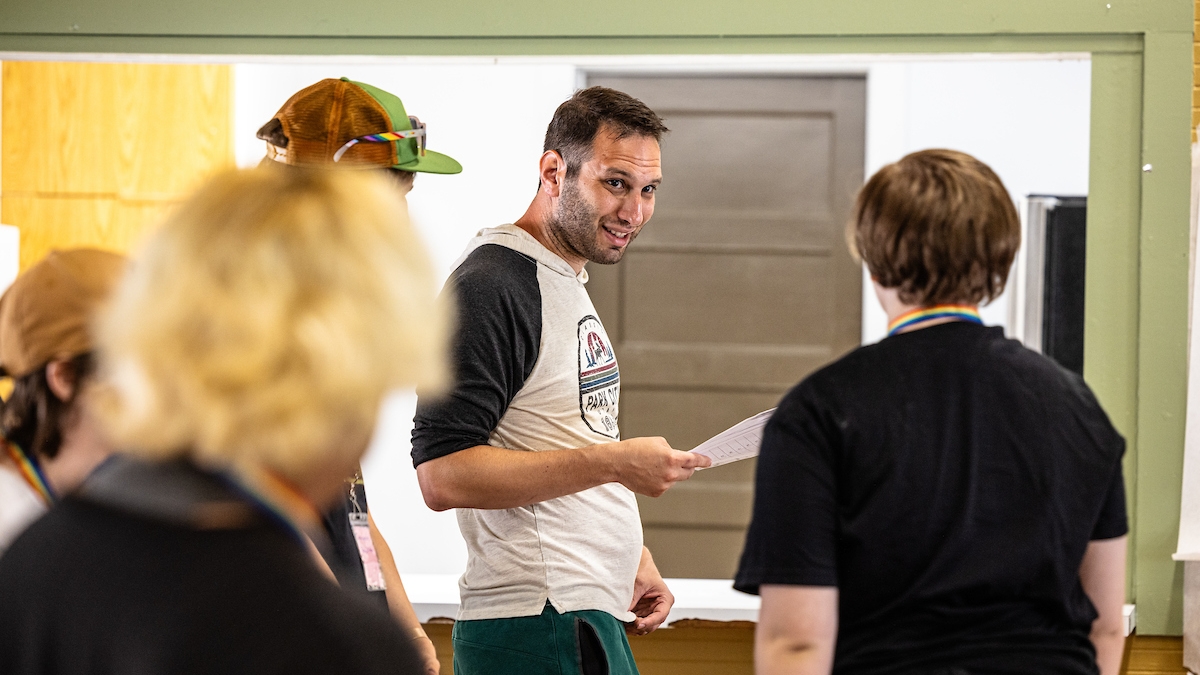
Pride Tree founder Grant Frailich plays a name game with campers on July 28, 2023, at Camp Pride Tree outside Las Vegas. Photo by Charlie Leight/ASU News
Editor's note: Arizona State University alumni are making a difference in every corner and community of the world, positively changing the lives of those they encounter. ASU News traveled around the U.S. in 2023 to profile five of those alums.
LAS VEGAS — The sounds of summer camp echo through the pine trees of Mt. Charleston, about 35 miles northwest of Las Vegas.
There is laughter and conversation, a basketball bouncing, a tetherball whipping around a pole. Inside a large teepee, a group of 10- to 12-year-olds play Uno or construct a puzzle. A few feet away, teenagers scream as a wasp flies into a cabin.
At 12:15 p.m., the campers line up for lunch outside the kitchen. One asks what they’ll be eating.
Tacos, she’s told.
“Hard shell or soft shell?” she asks.
“Both,” comes the reply.
“Yes!” she yells, smiling broadly.
That night, as the sun sets and the fires are lit, the campers will roast marshmallows and stargaze.
It is a typical summer camp day. And as the lights in the cabins turn off for the night, 31-year-old Arizona State University alum Grant Frailich will think about the kids and what the next day holds.
He’ll think, too, about his grandmother, about a 15-year-old child named Bee and how their lives inspired him — a straight man — to be here, running a camp for LGBTQ+ youth.
'There’s a need. This doesn’t exist. Let’s go make this exist.'
Frailich’s story — and the story of how he founded the Pride Tree, a nonprofit organization that provides after-school and summer programming for LGBTQ+ youth — begins long before he was born, and far from the bright lights of Las Vegas.
In 1942, Nazis began mass deporting Jews from the Warsaw Ghetto to the Treblinka killing center, 52 miles away.
Frailich’s grandmother, Regina Gruskin, was 11 when she was placed on a train that, according to Nazi officials, was headed for a “labor camp.” But word spread that train was actually headed to Treblinka. Gruskin’s father, Abraham, urged her to jump out of the window as the train was moving.
Without the opportunity to say goodbye, Gruskin jumped and, after spending months in the forest, found refuge with a Catholic family who hid her in their barn.
“One time the Gestapo pulled up in front of the house she was staying at, and Regina was hidden underneath the floorboard,” said Yvonne Frailich, Grant’s mother and Regina’s daughter. “They covered her with kerosene so that the dogs would not smell her.”
Gruskin eventually immigrated to the United States and married and, over the years, a young Grant Frailich would listen to his grandmother share stories about being a Polish Jew living through the Nazi regime. He’d hear her say that the one thing she could never control, no matter how hard she tried, was the sound of her heartbeat. She was always afraid it would give her away.
“She always used to drill this message into me,” Frailich said. “Millions of people died during World War II because ordinary people sat back and said, ‘Not my problem. They aren’t putting me onto a train. I don’t want to cause a scene. I don’t want to be inconvenient.’”
Those words would resonate with Frailich, whose family always was dedicated to the principles of social justice and giving back to help make the world a better place.
They would motivate him to donate some of the money he received for his bar mitzvah to a charitable fund.
They led him — after graduating from ASU with a degree in political science and getting his master’s degree in business administration and management in 2014 — to join Teach For America, which recruits college graduates to teach for at least two years in a public or public charter K–12 school in one of 52 low-income communities.
“I just always wanted to help people,” he said.
Frailich, who describes himself as a “married, straight white dude from an upper-middle-class background,” considered himself an ally of the LGBTQ+ community, but that was the extent of his involvement.
Devils Making a Difference
Read more in our series about ASU alumni helping others in their communities.
“It just wasn’t my cause,” he said.
Then, one day, while teaching online, he met Bee.
Bee, who uses they/them pronouns, described themselves to Frailich as gender fluid. They told Frailich they had been cyberbullied to the point of receiving death threats.
“It was heartbreaking,” Frailich said. “I asked, ‘What did you do?’ They said, ‘Well, I tried to talk about it with my friends, and they muted me because I was being annoying. I tried to talk about it with some adults, and they said, ‘You know taekwondo — you could just beat someone up if they come and try to mess with you.’”
Frailich asked Bee if he could inform the school principal of their conversation. Bee said yes. The next day, Frailich received an email from Bee’s mother, saying Bee was grateful to have Frailich as a teacher because they had been bullied by previous male teachers.
“Bee told me, ‘Mr. Frailich just lets me be me, and I’m so grateful for that,’ ” the mother wrote.
Frailich was thankful he could help Bee. But he knew there were other children experiencing the same challenges that Bee experienced. And once again he heard his grandmother’s words.
“She taught me it’s really not acceptable to stay out of issues,” Frailich said. “I have a platform, a voice, whatever you want to call it. I have the privilege to be able to get into rooms and have conversations. I couldn’t just kick back and chill with my wife and son and be like, ‘Whatever. It doesn’t matter to me. I don’t have a gay kid.’ That’s not how I’m wired.”
Frailich reached out to members of the community in Las Vegas for ideas of how he could help, created a board of directors and founded the Pride Tree in July 2021.
The organization’s after-school program — called Club Pride Tree — is in six Las Vegas-area schools. Led by teachers, the program allows LGBTQ+ youth the opportunity to have meaningful conversations without judgment, and it connects them to allies in the community.
“For instance, we have conversations around vocabulary,” Frailich said. “People get so confused with vocabulary like gender fluid and nonbinary. And what do all these words mean? Let’s go through this glossary of terms from the Human Rights Campaign and figure out what’s confusing to you.
“It’s to give kids a safe place to have those conversations and a safe place to ask questions.”
Angelique Burton, a board member and director of advocacy for Pride Tree, said the after-school program “provides the tools for our youth to tap in, go out into the world and be their most amazing, smart, wonderful, confident selves.”
“There’s so much conversation in the world about questioning people’s existence,” Burton added. “I think not having to constantly describe and defend yourself is a huge opportunity.”
As the Pride Tree expanded, Frailich was in the process of using his 15 years as a summer camp volunteer, staffer and director of logistics to create a summer camp for low-income youth in Las Vegas. But after his conversation with Bee, the formation of the Pride Tree and starting the Club Pride Tree after-school program, he discovered there were few summer camps in the country designed for LGBTQ+ kids.
“I knew summer camp is impactful and meaningful and fun, and it’s non-inclusive right now,” Frailich said. “How do we go pull off a summer camp that is inclusive for kids? Where do trans, gender-fluid and nonbinary kids fit into the traditional summer camp model of boys’ cabins and girls’ cabins?
“In my mind, it’s very simple. There’s a need. This doesn’t exist. Let’s go make this exist.”
'The coolest thing I’ve ever done'
As the campers and their parents arrived at Neon Boneyard Park in Las Vegas early on a sweltering July afternoon, they were greeted by the sound of “This Is Me,” from "The Greatest Showman," playing from a nearby speaker.
The bus for camp would leave in about an hour, with 16-year-old Theodore Collumb aboard.
Collumb identifies as transmasculine, asexual and aromantic.
“At my school I’ve had people scream slurs at me as I’m walking up the stairs,” Collumb said. “I’ve had people record me going down the hallways.”
Fifteen-year-old Liz Blumer, standing nearby, nodded in agreement. Blumer, who uses the pronouns she/they, said, “Society is not a place where I can always be myself.”
That wouldn’t be the case at Camp Pride Tree.
“It’s definitely going to be a bonding experience,” Blumer said. “It’s definitely going to be great connecting with everybody and sharing the good and bad experiences we’ve had with our lives.”
Forty-five kids ages 10 to 16 — along with 30 adult volunteers, including Grant’s parents, Yvonne and Alan, who were the head chefs — made their way to Mt. Charleston.
Frailich said 47% of the campers identified as transgender or nonbinary, and nearly 68% struggled with feelings of anxiety or depression over the previous 12 months.
Also, almost 20% of the campers were “allies,” rather than part of the LGBTQ+ community.
“One boy told me he had two dads and wanted to be the best son and ally he could be,” Frailich said. “He nearly made me cry.”
Program supervisor Liz Chambers, 24, said the four-day camp gives the LGBTQ+ kids a chance to “let down their guard.”
“I’ve gone to camps my whole life,” said Chambers, who is queer. “A lot of these camps I went to as a kid, it’s very gendered and not inclusive. Here, they 100% relate to each other, and they don’t feel scared to talk and tell each other what’s going on at home or in school.
“After last year’s camp, one of them came up to me and said, ‘This is the coolest thing I’ve ever done. I’ve been to camp before, and this is a complete 180.’”
Frailich is hopeful he can expand Camp Pride Tree to other states, including Arizona, in the future.
Turning words into action
Melissa Arias is the director of compliance for Pride Tree. Her child, Van, is 10 years old, is transgender and will be at camp for the first time.
“Van has always known who he was, more than most adults do,” Arias said. “Finding people who are like him is really exciting for me because they understand what he’s going through in a way that I can’t. So, I’m really excited for him to make some friends with people who know what he deals with.”
Arias didn’t know Frailich’s story when she first met him. She didn’t know about Regina Gruskin, a train bound for a killing camp and a troubled kid named Bee.
What she found out — what she knows now — is that the words Frailich heard turned into action.
“I’m very, very thankful for Grant and what he’s done for our family and the community,” Arias said. “He had this big idea. So many people have ideas, but very few have the follow-through. I’m so honored to have met him and have him part of our journey."
More Sun Devil community

Supporters show their generosity during Sun Devil Giving Day 2025
Thousands of Arizona State University supporters from across the globe came together on Sun Devil Giving Day on March 20 to give to scholarships, research, student programs and university initiatives…

New ASU women's basketball coach has sights set on championships
Molly Miller apologized for being a few minutes late for her Zoom interview Sunday afternoon.No apology was necessary.It’s been a crazy and hectic 72 hours for Miller, who guided Grand Canyon…
SolarSPELL wins 'best in show' award at South by Southwest
Arizona State University professors from a variety of disciplines made a big splash at the South by Southwest festival of technology and culture in Texas earlier this month.The ASU SolarSPELL…


